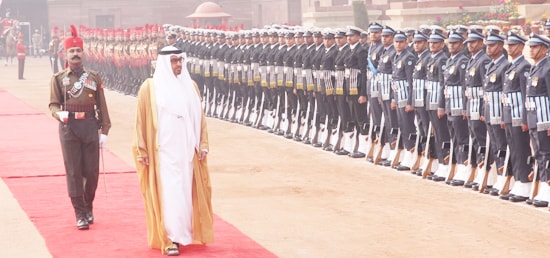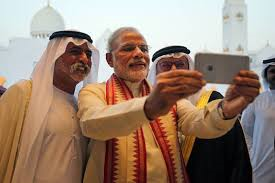
The relations between India and the United Arab Emirates, the Gulf’s economic powerhouse and home to 2.6 million Indians, are poised for a take-off with the two countries signing a transformative comprehensive strategic partnership agreement and a clutch of pacts straddling diverse areas, ranging from defence, maritime transport and energy to trade, logistics and cyber security.
Underlining the increasing salience of the Gulf region in India’s diplomatic calculus, Prime Minister Narendra Modi held talks with Crown Prince of Abu Dhabi Sheikh Mohammed bin Zayed Al Nahyan, the chief guest for the country’s 68th Republic Day celebrations. Sheikh Al Nahyan is only the third leader from the energy-rich region India has hosted for the Republic Day, and signals a marked acceleration in ongoing efforts by New Delhi to shape a greater West Asia policy. In the first two years of his government, Mr Modi signalled a sharp focus on the region through his visits to UAE, Saudi Arabia, Qatar and Iran.
Strategic Partnership
The talks in New Delhi on January 25 were all-encompassing and promises to pack more strategic heft and economic ballast in the burgeoning relationship between India and UAE.

The showpiece outcome was the elevation of India-UAE ties to the level of Comprehensive Strategic Partnership (CSP), which firmly positions the Gulf’s second largest economy as India’s preeminent partner in the region in both strategic and economic arenas. The framework agreement on CSP envisages core areas of expanded cooperation in areas such as defence and security, and builds on the templates outlined in joint statements in August 2015 and February 2016.
“We have been successful in creating new synergies in our ties. We have shaped an ambitious roadmap of engagement to make our comprehensive strategic partnership purposeful and action oriented. The agreement that was exchanged just now has institutionalized this understanding,” said Mr Modi at a joint media interaction with his guest from the UAE.
On the strategic side, the agreement on defence industry cooperation is significant as it envisages joint manufacturing of high-end weapons systems and transfer of technology.
Partnering India’s Growth Story
Taking a long-range view, another key outcome emanating from the talks in New Delhi was to impart a fresh push to the ongoing economic transformation of the India-UAE relationship, with PM Modi identifying the UAE as “an important partner in India’s growth story.” The focus will be on operationalising the $75 billion Infrastructure Investment Fund that was unveiled during Mr Modi’s visit to the UAE in August 2015. PM Modi outlined India’s expectations from the UAE in the economic arena. “I particularly welcome UAE’s interest in investing in India’s infrastructure sector. We are working to connect the institutional investors in UAE with our National Investment and Infrastructure Fund,” he said.
 “UAE can benefit by linking with our growth in manufacturing and services. We can jointly tap abundant opportunities in our initiatives aimed at building digital economy, human capital and smart urbanization in India. We are also encouraging and facilitating business and industry of both countries to increase the quality and quantum bilateral trade.”
“UAE can benefit by linking with our growth in manufacturing and services. We can jointly tap abundant opportunities in our initiatives aimed at building digital economy, human capital and smart urbanization in India. We are also encouraging and facilitating business and industry of both countries to increase the quality and quantum bilateral trade.”
In another important development, the energy ties are also set to acquire a strategic character. The agreement on oil storage and management between Indian Strategic Petroleum Reserves Limited and Abu Dhabi National Oil Company signals the deepening of the two countries in the field of energy.
Rising against terror: Co-operating in Afghanistan
In a move that will be closely watched in Pakistan, India and the UAE have also renewed their strategic resolve to intensify their cooperation in counter-terrorism and de-radicalisation. “We also feel that our growing engagement in countering violence and extremism is necessary for securing our societies,” said Mr Modi. There are no details on the nature of discussion between the leaders of India and the UAE on the volatile situation in Afghanistan in which five UAE diplomats were killed recently, allegedly by operatives of the Taliban and the Haqqani network. If the motive of the killers was to wean away the UAE from expanding ties with India, then they have failed miserably, as substantive outcomes emanating from the talks in New Delhi show.
Author Profile

- Manish Chand is Founder and Editor-in-Chief of India Writes Network (www.indiawrites.org) and India and World, a pioneering magazine focused on international affairs. He is CEO, Centre for Global India Insights, an India-based think tank focused on global affairs.
Latest entries
 India and the WorldFebruary 27, 2026Modi visit: India-Israel partnership enters a new era
India and the WorldFebruary 27, 2026Modi visit: India-Israel partnership enters a new era India and the WorldFebruary 24, 2026Unravelling Modi’s Israel journey: What to expect
India and the WorldFebruary 24, 2026Unravelling Modi’s Israel journey: What to expect India and the WorldFebruary 17, 2026South-by-South: Focus on people-centric solutions at India AI summit
India and the WorldFebruary 17, 2026South-by-South: Focus on people-centric solutions at India AI summit India and the WorldFebruary 7, 2026Modi hails interim India-US trade deal, Goyal says no concessions made on agriculture
India and the WorldFebruary 7, 2026Modi hails interim India-US trade deal, Goyal says no concessions made on agriculture







